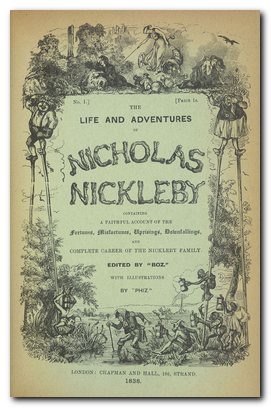tutorial, commentary, study resources, plot, and web links
Nicholas Nickleby first appeared as a serial novel in nineteen monthly instalments between 1838 and 1839, published by Chapman and Hall. It was Charles Dickens’ third novel, but he wrote it at the same time as he was completing his second novel, Oliver Twist. He had struck a best-selling formula with his first novel – The Pickwick Papers – an episodic narrative issued in monthly parts, and he stuck to this publishing format, selling 50,000 copies a month of each instalment, which cost one shilling per issue and two shillings for the final double issue.
It is worth noting, in terms of the history of the novel and literature as a cultural medium, that Charles Dickens’ name does not appear on the cover – only his nom de plume, ‘Boz’. And he is not the author but the editor of these recorded adventures – almost as if their existence were due to some other person or source.
In addition, each instalment of the serial was illustrated – in this case by his favourite artist, Hablot Knight Browne, who was also given a pseudonym of ‘Phiz’. The convention of illustrating novels persisted until the end of the nineteenth century and then disappeared in the early twentieth.
Nicholas Nickleby – critical commentary
The picaresque novel
Dickens greatly admired the novelists of the eighteenth century – Henry Fielding, Laurence Sterne, and Tobias Smollett – all of whom had inherited the earlier tradition of the novel as a picaresque narrative. That is, the focus of attention in a novel was on an individual who engaged with society and embarked on a series of adventures. In its original form the picaro was usually a low-life character, and this is perhaps reflected in Fielding’s hero (in Tom Jones) being a foundling, or in Smollett’s heroes Roderick Random and Peregrine Pickle being ‘groundlings’ or ordinary characters.
The traditional picaresque novel featured a one central character (Lazarillo de Tormes and Tom Jones for example), but Dickens gives this convention a creative twist by having essentially two central characters battling with the vicissitudes of society. Nicholas and his sister Kate are both young and vulnerable following their father’s death. They are saddled with a mother who is worse than useless as a moral and spiritual guide, and they are surrounded by villainous characters who wish to do them harm.
Nicholas first has to battle with the psychopathic schoolmaster Wackford Squeers and his equally brutal family. Then he is also thwarted by his uncle, Ralph Nickleby
Ralph Nickleby is also the spider at the centre of the corrupt web of upper-class rakes trying to ensnare Kate Nickleby. Even though it is Sir Willoughby Hawk who is her main assailant, he is a client of Ralph’s and operates under his roof. Kate quite rightly complains that the very person who should be protecting her honour (her uncle) is putting her at risk by exposing her to moral danger and actually using her as live bait to ensnare the rich but simple Lord Frederick Verisopht.
The elements of the picaresque novel are normally movement – the journey – encounters with unknown individuals who may be rogues desperadoes, or comic characters. This was the novel as sheer entertainment, and Dickens happily embraced the genre. As well as featuring the hero’s mixed fortunes in society, encounters with rogues and villains, there were also a lot of knockabout comic and farcical scenes, plus no shortage of real physical violence – much in evidence here in the scenes at Dotheboys Hall.
There is very little notion of a tightly plotted story. The essence of the picaresque is a loose, episodic tale where one event follows another. Nevertheless, Dickens inserts elements which typify his later command of the tightly plotted serial novel, with a structure unified by overarching metaphors and symbols.
He introduces mysterious and dramatically interesting details which act as a thread through the episodes of the story. For instance, the curious figure of Newman Noggs who works for but despises Ralph Nickleby. He passes a message to Nicholas as he embarks at the start of the novel on his journey to Yorkshire and Dotheboys Hall. This creates a link between them which enables Nicholas to survive the vicissitudes of his exile and even his return under an assumed name (Johnson).
The negative parent figure
We know that Dickens was very concerned about the ill-treatment of children – despite the fact that he neglected his own. His novels are full of neglected and poor youngsters, children forced into work and crime, and pathetic under-aged beings who suffer and die young.
The other side of this coin is the parent figure who neglects those under its supervision and care. Nicholas Nickleby has a wide range of characters who are what might be called the negative parent figure – people who are responsible for people younger than themselves who neglect their welfare and in some cases actively seek to undermine it.
First in order of appearance of these figures is Wackford Squeers, the sadistic headmaster of Dotheboys Hall, who acts in loco parentis to his pupils. Squeers is motivated entirely by greed and self-gratification. He actually robs the pupils under his care; he beats them; more or less starves them; and actively stands in the way of their securing any possible outside help. He is what we would now classify as a sociopath or even a psychopath
Mr Bray is one of the many miserly characters in the novel, but his outstanding characteristic is that of an emotionally tyrannical father figure. He has a daughter (Madeleine) who is slavishly devoted to him, but rather than appreciate her efforts, he abuses her unmercifully and turns her life into a living misery. Rather like Squeers, he is entirely self-regarding and even sneers at the very sources of income which keep him alive (the ‘purchases’ made by the Cheerybles).
Mrs Nickleby is a great comic figure in the novel – a social snob even when her family has become penniless, and a garrulous featherbrain who fails to understand anything that is going on. She doesn’t actually make her children suffer, but she is certainly derelict in his role as a parent, and it is interesting to note that she shares self-regard and a solipsistic view of the world with the other negative parent figures in the novel.
Ralph Nickleby turns out to be the worst parent figure of all. He is dominated by an almost pathological worship of money. He marries for financial advantage, and when his wife leaves him, he gives away his son – who becomes the abandoned Smike at Dotheboys Hall. The conditions there – in addition to his consumption – contribute to his early death.
Money, inheritance, and class
The origins of the entire narrative lie in a version of the Biblical parable of the talents. At his death old Nicholas Nickleby divides his money between two sons, Ralph and John. One (Ralph) becomes a money lender (a usurer) and makes more money: The other (John) invests his portion of the inheritance in the stock market and loses everything.
This accounts for the tensions within young Nicholas Nickleby’s family and his personal life. He has been raised and educated to be a ‘gentleman’, but he suddenly finds himself with no money and a mother and sister for whom he is responsible.
Nicholas is forced to work as an almost unpaid assistant schoolteacher, whilst his mother clings to comically misplaced snobbish standards as if she were still upper class. Kate too is forced into low-paid work, and can only hope for a suitable marriage to save her from her plight.
But any marriage should be on reasonably equal terms. This explains the dramatically stretched issue of conscience and scruples when Nicholas insists that Kate should not encourage Frank Cheeryble as a suitor – because Frank will inherit from his twin uncles, whereas Kate has nothing to inherit.
Nicholas puts an equally severe limit on himself when he asks for Madeleine to be taken away from his mother’s house. He is in love with her, but he realises that the Cheerybles will look after her financially, whereas he has no inheritance to offer her. He belongs (albeit temporarily) to a lower social class. However, these problems are resolved by the fairy-tale generosity of the Cheerybles.
Nicholas Nickleby – study resources
![]() Nicholas Nickleby – Oxford World’s Classics – Amazon UK
Nicholas Nickleby – Oxford World’s Classics – Amazon UK
![]() Nicholas Nickleby – Oxford World’s Classics – Amazon US
Nicholas Nickleby – Oxford World’s Classics – Amazon US
![]() Nicholas Nickleby – Wordsworth Classics – Amazon UK
Nicholas Nickleby – Wordsworth Classics – Amazon UK
![]() Nicholas Nickleby – Wordsworth Classics – Amazon US
Nicholas Nickleby – Wordsworth Classics – Amazon US
![]() Charles Dickens – biographical notes
Charles Dickens – biographical notes
![]() Nicholas Nickleby – eBook at Project Gutenberg
Nicholas Nickleby – eBook at Project Gutenberg
![]() Nicholas Nickleby – audioBook at LibriVox
Nicholas Nickleby – audioBook at LibriVox
![]() Nicholas Nickleby – Hablot Knight Browne (Phiz) illustrations
Nicholas Nickleby – Hablot Knight Browne (Phiz) illustrations
![]() The Cambridge Companion to Charles Dickens – Amazon UK
The Cambridge Companion to Charles Dickens – Amazon UK
![]() Nicholas Nickleby – Audio book (unabridged) – Amazon UK
Nicholas Nickleby – Audio book (unabridged) – Amazon UK
![]() Charles Dickens’ London – interactive map
Charles Dickens’ London – interactive map
![]() Oxford Reader’s Companion to Charles Dickens – Amazon UK
Oxford Reader’s Companion to Charles Dickens – Amazon UK
Nicholas Nickleby – plot summary
Chapter I. Old Mr Nickleby leaves money to his two sons, Ralph and Nicholas. Ralph invests his inheritance and becomes a successful money-lender. Nicholas speculates with his money on the stock exchange and loses everything.
Chapter II. Ralph and fellow entrepreneurs hold a public meeting to promote interest in a parliamentary bill to establish a muffin-making business, which will in fact be a monopoly.
Chapter III. Ralph receives news of the death of his brother. He visits his sister in law and her two young children and, completely lacking in generosity and compassion, arranges to ‘find a job’ for young Nicholas.
Chapter IV. Wackford Squeers enrolls pupils for his school at Dotheboys Hall in Yorkshire, and Ralph persuades him to take on Nicholas as an assistant schoolmaster.
Chapter V. Nicholas sets off for Yorkshire. Before departure Newman Noggs slips him a mysterious letter. Squeers feeds himself liberally, but completely neglects his pupils. The coach overturns in bad weather.
Chapter VI. The travellers recover at a nearby inn, where they regale each other with tales of ‘The Five Sisters of York’ and ‘The Baron of Grogzwig’.
Chapter VII. Nicholas arrives at Dotheboys Hall, meets the abandoned boy Smike, and is given a frugal supper by Mrs Squeers. He reads the mysterious letter from Noggs, offering him sympathy and accommodation in London if ever he should need it.
Chapter VIII. Squeers runs the school in a brutal and exploitative manner. All the pupils are broken and miserable. Nicholas is ashamed of being there. Smike has no friends and no hope.
Chapter IX. The plain Fanny Squeers decides to fall in love with Nicholas, then announces to her friend Matilda that she is ‘almost’ engaged to him. The two young women entertain their beaux to tea, then fall out in rivalry with each other.
Chapter X. Miss Le Crevey paints a miniature portrait of Kate Nickleby. Ralph Nickleby finds Kate a questionable job as a dressmaker with Madam Mantalini and moves her mother into an empty house he owns.
Chapter XI. Kate and her mother leave Miss Le Crevey and are taken by Noggs to live in an old run down house in a poor party of the City.
Chapter XII. Fanny and Matilda repair their disagreement of the day before. Matilda is to be married in three weeks. They meet Nicholas and claim he is in love with Fanny. When he refutes this claim, Fanny vows vengeance on Nicholas, who comforts the persecuted Smike.
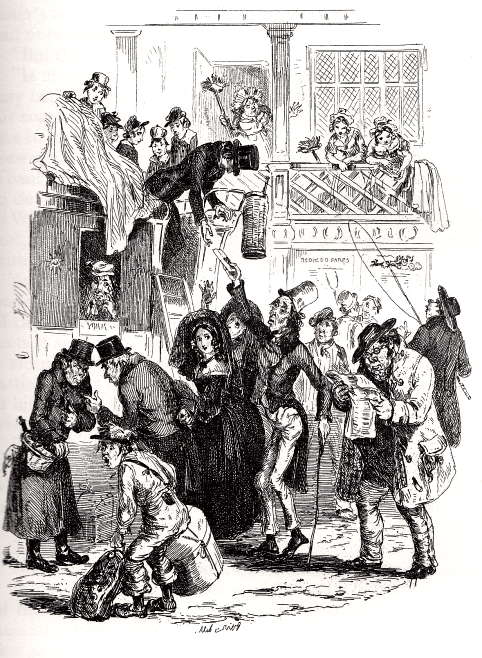
Chapter XIII. Smike suddenly runs off from the school, but is hunted down and recaptured. When Squeers starts to administer a public flogging before the assembled boys, Nicholas intervenes and beats Squeers. Nicholas leaves the school to go back to London, and is followed by Smike.
Chapter XIV. A wedding anniversary party is under way in the rented rooms of the Keriwigs. nTheir neighbour Noggs is in attendance, despatching punch, when Nicholas and Smike arrive.
Chapter XV. The Squeers have sent a defamatory letter to Ralph Nickleby, denouncing Nicholas. Noggs urges patience. Meanwhile Lillyvick lords it over the party and its members. When the babysitter’s hair catches fire, Nicholas rescues the baby and is admired by everybody as a gentleman and an aristocrat
Chapter XVI. Next day Nicholas goes in search of a job, but turns down the position of secretary to an unscrupulous member of parliament. Instead, Noggs arranges for him to become private tutor to the Kenwig girls, under the name of Johnson.
Chapter XVII. Kate starts work at Mantalini’s where she feels demeaned by the nature of her position. The Mantalinis are semi-comic buffoons, somehow connected with Ralph Nickleby.
Chapter XVIII. Miss Knag has an almost Sapphic crush on Kate, who makes a good impression on visiting customers. But when Kate is chosen to display bonnets instead of Miss Knag, she turns hysterically against her.
Chapter XIX. Kate in invited to dinner at her uncle’s house. But the guests are all-male boors, and she has been used as bait to lure a rich young lord. One drunken guest tries to attack her. Ralph Nickleby feels the first twinges of conscience regarding his niece.
Chapter XX. Ralph confronts Kate and her mother with Nicholas’s ‘misdeeds’ (reported by Squeers). Nicholas stands up to Ralph and maintains his innocence – but he is powerless to do anything more. Everything is against him – but he sticks by Smike.
Chapter XXI. The Mantalinis are bankrupted (by Ralph) and Kate loses her job. She becomes a companion to Mrs Witterly, who suffers from ‘an excess of soul’.
Chapter XXII. Nicholas decides to leave London. He and Smike walk to Portsmouth, but before they get there Nicholas meets the theatrical manager Vincent Crummles, and in desperation is persuaded to join his troupe.
Chapter XXIII. When they reach Portsmouth Crummles introduces Nicholas to his band of itinerant ‘actors’, including the ‘infant phenomenon’. Crummles gives Nicholas a French text to translate and plagiarize for performance in a few day’s time.
Chapter XXIV. Nicholas writes the play for Miss Snevellicci’s benefit performance (one of many) – then has to go out touting for subscriptions.The play is put on, and despite its ridiculous and corny plot is a big success.
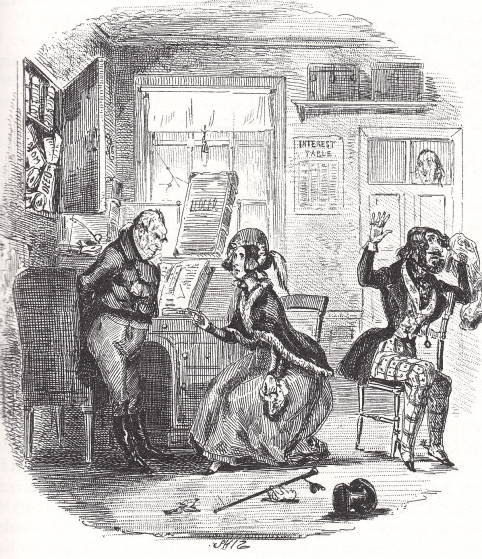
Chapter XXV. Mr Lillyvick the water tax collector arrives to tell Nicholas of his impending marriage to Henrietta Petowker, who is joining the troupe. A comic wedding scene ensues. Nicholas teaches Smike his simple part in Romeo and Juliet.
Chapter XXVI. Hawk and Verisopht conspire to pursue the pretty Kate. Hawk wishes to trap Verisopht financially. They visit Ralph Nickleby, who wants to entrap them both. Mrs Nickel by arrives and naively hopes that Kate will marry one of these corrupt rakes. Ralph’s conscience pricks him for a second time.
Chapter XXVII. Mrs Nickleby is fascinated with the idea of upper-class connections. She is visited by Pyke and Pluck who flatter her and invite her to the theatre on behalf of Hawk, who oppresses Kate again. They are also introduced to Mrs Witterly, who is also flattered by the attention of these rakes.
Chapter XXVIII. Hawk and his entourage become regular visitors chez Mrs Witterly – and continue to oppress Kate. She appeals to her uncle Ralph for help – but he refuses to do anything, and even though he has encouraged their behaviour, he disapproves of it. So does Noggs, who disapproves of his employer Ralph.
Chapter XXIX. Lenville is jealous of Nicolas’s success in the acting troupe. He offers a challenge, but Nicholas knocks him down. Nicholas communicates with Noggs via post, who replies that Kate might need his protection in the future.
Chapter XXX. Nicholas prepare to leave the acting company. He goes to dinner, where Mr Snevellicci gets drunks and kisses all the women. An urgent note from Noggs arrives, so Nicholas and Smike leave for London by the morning coach.
Chapter XXXI. Noggs negotiates with Miss La Crevey to delay telling Nicholas about Kate’s problems on his imminent arrival in ~London – to forestall rash actions.
Chapter XXXII. Nicholas reaches London and immediately goes in search of Noggs, who has deliberately gone out as part of his plan. Nicholas wanders into a hotel and overhears Hawk maligning Kate. He challenges him, but Hawk refuses to reveal his identity. They fight in the street, and Hawk sustains injuries when his cab overturns.
Chapter XXXIII. Nicholas removes Kate from Mrs Witterly’s , his mother from her lodgings, and writes to Ralph denouncing him as a villain.
Chapter XXXIV. Ralph is visited by Mr Mantalini who needs money. Mrs Mantalini argues with her husband., during which time Ralph learns about the coach accident. Mr Squeers arrives, and Ralph quizzes him about Smike’s identity and origins.
Chapter XXXV. Mrs Nickleby and Kate meet Smike, then Nicholas goes in search of a job, where he meets the improbably philanthropic Mr Cheeryble, who provides him with a well-paid job, a home, and gifts of furniture.
Chapter XXXVI. Mrs Kenwigs has a baby. The family all congratulate themselves on their future prospects, but when Nicholas arrives with the news that their ‘benefactor’ Lillyvick has married Henrietta Petowker in Portsmouth, they go to pieces ,thinking that their ‘expectations’ have been ruined.
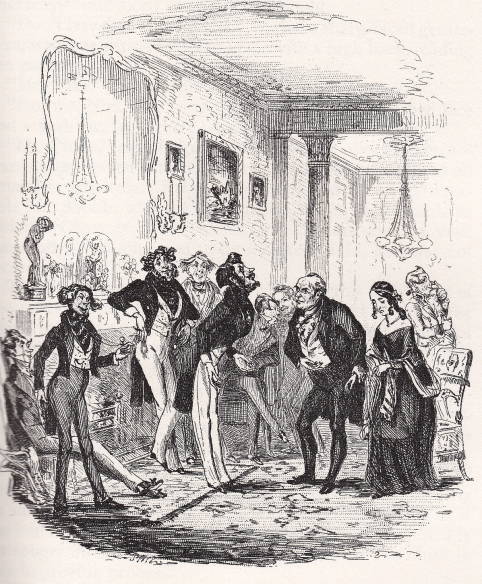
Chapter XXXVII. Nicholas makes a success of his introduction to working at Cheeryble’s, and old Tim Linkinwater’s birthday is celebrated in the office with lots of toasting and good cheer. Mrs Nickleby confides in Nicholas that she is being courted by their next-door neighbour by throwing cucumbers over the wall.
Chapter XXXVIII. Miss La Crevey thinks that Smike is changing significantly. Ralph Nickleby visits Hawk who is still recovering from his injuries in the coach crash. Lord Verisopht is amongst the rakes but he thinks that Nicholas has acted honourably in defending his sister’s reputation. On his way back home, Smike is captured by Squeers and held prisoner.
Chapter XXXIX. John Browdie arrives in London with his new bride Matilda Price and her friend Fanny Squeers.. They meet Mr Squeers at the Saracen’s Head That night Browdie helps Smike to escape from Squeers’ clutches.
Chapter XXXX. Nicholas falls in love with a girl he saw very briefly in the Registry Office. He commissions Noggs to find out who she is and where she lives. He does this and actually arranges a meeting with her late at night.But when they get there it is the wrong girl.
Chapter XXXXI. The eccentric (mad) man next door continues to pay court to Mrs Nickleby – who is flattered by his attentions, even though she feigns to reject them.
Chapter XXXXII. Nicholas visits John Browdie at the Saracen’s Head. Whilst they are discussing Fanny Squeers’ lack of marriage prospects, she suddenly appears. There is a comic argument between Fanny and Matilda, then between Squeers and Browdie
Chapter XXXXIII. Following the altercation at the Saracen’s Head, Nicholas meets Frank Cheeryble, with whom he feels a close bond. Yet he immediately wonders if he is a rival for the mysterious and beautiful girl – to whom he has never spoken. Frank and one of his uncles visit the Nickleby home the following Sunday, and everybody has a good time.
Chapter XXXXIV. Ralph Nickleby is out collecting debts when he is tracked down by Mr Booker, a former business associate who has been in jail. Booker threatens to reveal compromising information, but Ralph calls his bluff and refuses to help him.There is a fake suicide by Mr Mantalini, then Ralph goes off withSqueers and a stranger, with Noggs in pursuit.
Chapter XXXXV. Whilst John and Matilda Browdie are at the Nickleby cottage they are interrupted by Ralph Nickleby, Squeers, and Mr Snawley, who claims to be Smike’s estranged father. THey wish to capture Smike and take him back to Yorkshire, but Smike does not want to go.. After they throw out Squeers, Ralph leaves, threatening legal action against Nicholas.
Chapter XXXXVI. Nicholas relates these incidents to the Cheerybles, who tell him a similar story about the beautiful girl who has devoted herself to an unloving father who is a wastrel. They want to use Nicholas as a means of supplying money to her. This enables him to meet Madeleine Bray and her thankless father.
Chapter XXXXVII. Ralph Nickleby arrives at his office with Arthur Gride, who relates his plan to marry Madeleine Bray so as to acquire a property she will inherit. Ralph forces him to sign an agreement between them – all overheard by Noggs. They visit Bray and Madeleine and put their plan into motion, hoping that the greedy and heartless Bray will persuade Madeleine to accept.
Chapter XXXXVIII. Nicholas is upset regarding his role in the supply of money to Madeleine Bray. He then meets up with the Crummles theatrical troupe giving their farewell performances before going to America. There is another lengthy dinner with speeches.
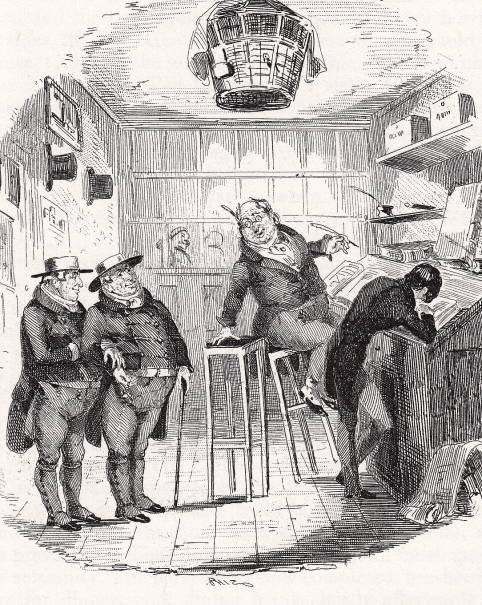
Chapter XLIX. In the Nickleby household Smike is suffering from consumption, but hides it from everyone. The mad old man from next door comes down the chimney in pursuit of Mrs Nickleby, but then changes to Miss La Crevey when he sees her.
Chapter L. Sir Mulberry Hawk appears at Hampton Races after recuperating abroad. He quarrels with Lord Verisopht, who has a guilty conscience regarding his part in the plot against Kate. That night, after gambling and drinking, they fight a duel, in which Lord Frederick is killed.
Chapter LI. Arthur Gride selects his clothes for the marriage to Madeleine Bray. Noggs has been approached by the mysteriousMr Brooker, and he tells Nicholas about Gride’s plan to marry Madeleine Bray.
Chapter LII. Noggs takes Moreleen Kenwig to the barber, where they meet Lillyvick. His wife Henrietta has eloped with a solider, so he is received at the Kenwigs where he reverses the terms of his will in their favour, following much sycophancy on both sides.
Chapter LIII. Nicholas appeals directly to Madeleine to call off or at least delay the marriage. He explains the plot between her father and Gride. But she refuses: she is sacrificing herself to gain the money promised to support her father. Nicholas then goes to Gride and offers to buy him off, but Gride refuses.
Chapter LIV. Ralph and Arthur Gride arrive at the Bray house on the morning of the wedding, but suddenly Nicholas and Kate arrive to confront them and take Madeleine away. There is a stand off, and then Bray drops dead upstairs. Nicholas takes Madeleine away telling Ralph that his business has collapsed.
Chapter LV. Mrs Nickleby is convinced that Frank Cheeryble is in love with Kate, who is looking after Madeleine as she recovers. Mrs Nickleby asks Nicholas to encourage the relationship, but he warns against it on the grounds that they are poor, whereas Frank has ‘expectations’ from his uncles. Nicholas is then commissioned to take the ailing Smike to Devon for convalescence.
Chapter LVI. Ralph has lost £10,000 in a bank crash. Returning to Gribe’s house, they discover that old Peg has stolen incriminating papers and absconded. Ralph devises an elaborate plan of revenge (on Nicholas and just about everybody else) which includes the Snawley and Smike relationship, Madeleine’s inheritance, and recovery of Gride’s stolen documents. He enlists the services of Squeers to do the dirty work and carefully excludes all mention of himself from the arrangements.
Chapter LVII. Ralph has located old Peg and Squeers visits her in a drunken state. He persuades her to show him the documents – but whilst they are inspecting them Frank Cheeryble and Noggs sneak into the room and knock Squeers out.
Chapter LVIII. Nicholas takes Smike to Devon where they share a bucolic and tranquil existence. Smike has a fleeting vision of the man who first took him to Dotheboys Hall, reveals that he has been in love with Kate , and dies.
Chapter LIX. An anxious Ralph is visited by Charles Cheeryble who wishes to warn him of something – but he dismisses him. Ralph goes off in search Noggs, Squeers, and Snawley, but none of them are to be found. So he goes to Cheerybles where he is confronted by Noggs who has unravelled the whole pilot. They offer him an honourable escape, but he scorns it.
Chapter LX. Ralph tracks down Squeers at the police station where he is being held on remand. There are signs that even Squeers is turning against him. Then he returns to Cheerybles, where they produce Ralph’s former employee Mr Brooker, who reveals that Smike was Ralph’s son. Ralph suddenly disappears.
Chapter LXI. Nicholas returns from Devon and learns that Kate has refused an offer of marriage from Frank Cheeryble on grounds of differences in their social positions. Nicholas vows to do the same regarding Madeleine, and asks the Cheerybles to remove her from his mother’s house.
Chapter LXII. Ralph retreats to his house, followed by a black cloud, and is oppressed by feelings of defeat and the fact that his enemy Nicholas was the person who looked after his own son, Smike. He goes into the attic and hangs himself.
Chapter LXIII. The Cheerybles summon everyone to a dinner at which the details of Madeleine’s inheritance are made known and the two couples – Frank and Kate, and Nicolas and Madeleine – are united.Then Tim Linkinwater proposes to Miss La Crevey, who accepts, much to Mrs Nickleby’s disgust.
Chapter LXIV. Nicholas travels to Yorkshire to see his friend John Browdie and brings him up to date with all the news. It is revealed that Squeers has been found guilty and transported for seven years. John Browdie rides over to Dotheboys Hall where the boys revolt against Mrs Squeers and her two offspring. They then all run away.
Conclusion. Nicholas marries Madeleine on the same day that Frank marries Kate. Nicholas becomes a partner in the firm. Ralph’s money is left un-touched and reverts to the State. Gride escapes punishment, but is then murdered. Hawk lives abroad, but on return is jailed for debt, where he dies.

Nicholas Nickleby – principal characters
| Old Mr Nickleby | Nicholas’s grandfather |
| Ralph Nickleby | his elder son, who becomes a speculator |
| Nicholas Nickleby | his younger son, who loses his money and dies |
| Mrs Nickleby | his widow, a naive and gullible woman |
| Nicholas Nickleby | his son, good-natured and personable (19) |
| Kate Nickleby | Nicholas’s pretty sister |
| Newman Noggs | one-eyed clerk to Ralph Nickleby, ‘a decayed gentleman’ |
| Wackford Squeers | an unscrupulous, greedy, and brutal ‘schoolmaster’ |
| Mrs Squeers | his equally vulgar and stupid wife |
| Fanny Squeers | their plain daughter (23) who falls for Nicholas |
| Smike | a desperate abandoned boy, unpaid skivvy to Squeers (19) |
| Miss Le Crevey | an artist in portrait miniatures |
| Matilda Price | a pretty friend (and rival) of Fanny Squeers |
| John Browdie | her fiancée, a tall Yorkshire corn-merchant with a Geordie accent |
| Mr Mantalini (actually Murtle) | a ridiculous fop |
| Mrs Mantalini | his (new) wife, a dressmaker |
| Mr Kenwig | a turner in ivory |
| Mr Lillyvick | a pompous collector of water taxes |
| Mr Crowl | a dubious associate of Noggs who wears a red wig |
| Miss Knag | garrulous and hysterical shop manager at Mantalinis |
| Mortimer Knag | her brother, a gloomy bookseller and novelist, former admirer of Mrs Mantalini |
| Mrs Julia Witterly | a social climbing hypochondriac who employs Kate as a companion |
| Henrietta Petowker | marries Lillyvick, then leaves him for another man |
| Sir Mulberry Hawk | a lecherous nobleman who pursues Kate |
| Lord Frederick Verisopht | a simple dupe of Hawk, who kills him in a duel |
| The Cheerybles | twin brothers and philanthropists |
| Frank Cheeryble | their nephew, who falls in love with Kate |
| Timothy Linkinwater | their chief clerk, who marries Miss La Crevey |
| Mr Walter Bray | a selfish and dying miser |
| Madeleine Bray | his beautiful and devoted daughter |
| Arthur Gride | an old, greedy, and corrupt miser who tries to marry Madeleine |
| Peg Sliderskew | his old and ugly housekeeper |
| Mr Brooker | an ex-convict and formerly Ralph’s clerk |
Further reading
Biography
![]() Peter Ackroyd, Dickens, London: Mandarin, 1991.
Peter Ackroyd, Dickens, London: Mandarin, 1991.
![]() John Forster, The Life of Charles Dickens, Forgotten Books, 2009.
John Forster, The Life of Charles Dickens, Forgotten Books, 2009.
![]() Edgar Johnson, Charles Dickens: His Tragedy and Triumph, Little Brown, 1952.
Edgar Johnson, Charles Dickens: His Tragedy and Triumph, Little Brown, 1952.
![]() Fred Kaplan, Dickens: A Biography, Johns Hopkins University Press, 1998.
Fred Kaplan, Dickens: A Biography, Johns Hopkins University Press, 1998.
![]() Frederick G. Kitton, The Life of Charles Dickens: His Life, Writings and Personality, Lexden Publishing Limited, 2004.
Frederick G. Kitton, The Life of Charles Dickens: His Life, Writings and Personality, Lexden Publishing Limited, 2004.
![]() Michael Slater, Charles Dickens, Yale University Press, 2009.
Michael Slater, Charles Dickens, Yale University Press, 2009.
Nicholas Nickleby
![]() Bernard Bergonzi, ‘Nicholas Nickleby’, Dickens and the Twentieth Century, ed. John Gross and Gabriel Pearson, London: Routledge, 1962
Bernard Bergonzi, ‘Nicholas Nickleby’, Dickens and the Twentieth Century, ed. John Gross and Gabriel Pearson, London: Routledge, 1962
![]() John Bowen, ‘Performing Business, Training Ghosts: Transcending Nickleby, ELH 63, 1996.
John Bowen, ‘Performing Business, Training Ghosts: Transcending Nickleby, ELH 63, 1996.
![]() V.C. Clinton-Baddeley, ‘Snevellicci’, Dickensian 57, 1961
V.C. Clinton-Baddeley, ‘Snevellicci’, Dickensian 57, 1961
![]() Phillip Collins , Dickens and Education, London: Macmillan, 1963
Phillip Collins , Dickens and Education, London: Macmillan, 1963
![]() Norman Russell, ‘Nicholas Nickleby and the Commercial Crisis of 1825′, Dickensian 77, 1981.
Norman Russell, ‘Nicholas Nickleby and the Commercial Crisis of 1825′, Dickensian 77, 1981.
![]() Paul Schlike, Dickens and Popular Entertainment, London: Allen and Unwin, 1985.
Paul Schlike, Dickens and Popular Entertainment, London: Allen and Unwin, 1985.
![]() Michael Slater, The Composition and Monthly Publication of Nicholas Nickleby, London: Scholar Press, 1973.
Michael Slater, The Composition and Monthly Publication of Nicholas Nickleby, London: Scholar Press, 1973.
General criticism
![]() G.H. Ford, Dickens and His Readers, Norton, 1965.
G.H. Ford, Dickens and His Readers, Norton, 1965.
![]() P.A.W. Collins, Dickens and Crime, London: Palgrave, 1995.
P.A.W. Collins, Dickens and Crime, London: Palgrave, 1995.
![]() Philip Collins (ed), Dickens: The Critical Heritage, London: Routledge, 1982.
Philip Collins (ed), Dickens: The Critical Heritage, London: Routledge, 1982.
![]() Andrew Sanders, Authors in Context: Charles Dickens, Oxford University Press, 2009.
Andrew Sanders, Authors in Context: Charles Dickens, Oxford University Press, 2009.
![]() Jeremy Tambling, Going Astray: Dickens and London, London: Longman, 2008.
Jeremy Tambling, Going Astray: Dickens and London, London: Longman, 2008.
![]() Donald Hawes, Who’s Who in Dickens, London: Routledge, 2001.
Donald Hawes, Who’s Who in Dickens, London: Routledge, 2001.
Other works by Charles Dickens
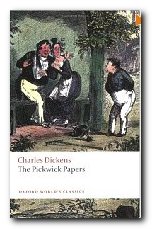 Pickwick Papers (1836-37) was Dickens’ first big success. It was issued in twenty monthly parts and is not so much a novel as a series of loosely linked sketches and changing characters featured in reports to the Pickwick Club. These recount comic excursions to Rochester, Dingley Dell, and Bath; duels and elopements; Christmas festivities; Mr Pickwick inadvertently entering the bedroom of a middle-aged lady at night; and in the end a happy marriage. Much light-hearted fun, and a host of memorable characters.
Pickwick Papers (1836-37) was Dickens’ first big success. It was issued in twenty monthly parts and is not so much a novel as a series of loosely linked sketches and changing characters featured in reports to the Pickwick Club. These recount comic excursions to Rochester, Dingley Dell, and Bath; duels and elopements; Christmas festivities; Mr Pickwick inadvertently entering the bedroom of a middle-aged lady at night; and in the end a happy marriage. Much light-hearted fun, and a host of memorable characters.
![]() Buy the book here
Buy the book here
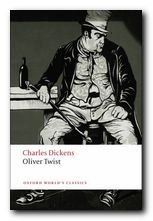 Oliver Twist (1837-38) expresses Dickens’ sense of the vulnerability of children. Oliver is a foundling, raised in a workhouse, who escapes suffering by running off to London. There he falls into the hands of a gang of thieves controlled by the infamous Fagin. He is pursued by the sinister figure of Monks who has secret information about him. The plot centres on the twin issues of personal identity and a secret inheritance (which surface again in Great Expectations). Emigration, prison, and violent death punctuate a cascade of dramatic events. This is the early Victorian novel in fine melodramatic form. Recommended for beginners to Dickens.
Oliver Twist (1837-38) expresses Dickens’ sense of the vulnerability of children. Oliver is a foundling, raised in a workhouse, who escapes suffering by running off to London. There he falls into the hands of a gang of thieves controlled by the infamous Fagin. He is pursued by the sinister figure of Monks who has secret information about him. The plot centres on the twin issues of personal identity and a secret inheritance (which surface again in Great Expectations). Emigration, prison, and violent death punctuate a cascade of dramatic events. This is the early Victorian novel in fine melodramatic form. Recommended for beginners to Dickens.
![]() Buy the book here
Buy the book here
Charles Dickens – web links
Charles Dickens at Mantex
Biographical notes, book reviews, tutorials and study guides, free eTexts, videos, adaptations for cinema and television, further web links.
![]() Charles Dickens at Wikipedia
Charles Dickens at Wikipedia
Biography, major works, literary techniques, his influence and legacy, extensive bibliography, and further web links.
Charles Dickens at Gutenberg
A major collection of free eTexts of the major works in a variety of formats.
Dickens on the Web
Major jumpstation including plots and characters from the novels, illustrations, Dickens on film and in the theatre, maps, bibliographies, and links to other Dickens sites.
The Dickens Page
Chronology, eTexts available, maps, filmography, letters, speeches, biographies, criticism, and a hyper-concordance.
Charles Dickens at the Internet Movie Database
Adaptations of the major novels and stories for the cinema and television – in various languages
A Charles Dickens Journal
An old HTML website with detailed year-by-year (and sometimes day-by-day) chronology of events, plus pictures.
Hyper-Concordance to Dickens
Locate any word or phrase in the major works – find that quotation or saying, in its original context.
Dickens at the Victorian Web
Biography, political and social history, themes, settings, book reviews, articles, essays, bibliographies, and related study resources.
Charles Dickens – Gad’s Hill Place
Something of an amateur fan site with ‘fun’ items such as quotes, greetings cards, quizzes, and even a crossword puzzle.
© Roy Johnson 2014
More on Charles Dickens
More on literature
More on the novella
More on literary studies
More on short stories
